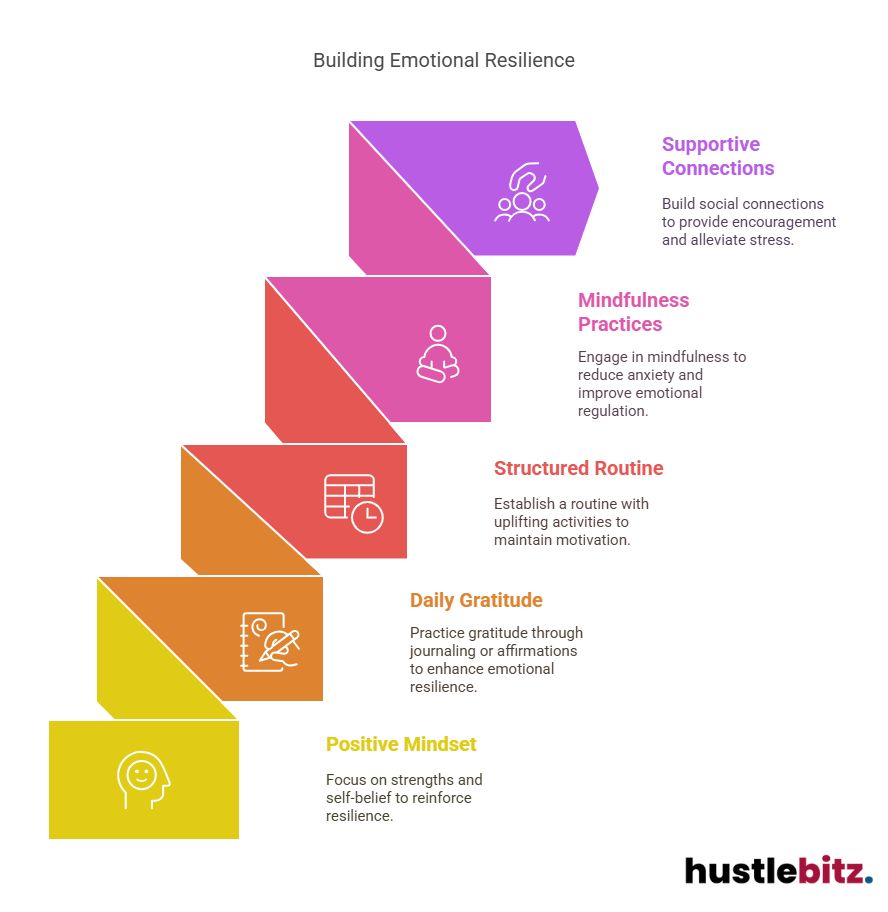Positive momentum is vital for staying upbeat during life’s challenges. It starts with effective goal setting, which provides direction and motivation. Cultivating gratitude enhances emotional resilience and fosters optimism, while daily affirmations reinforce a positive outlook. Embracing resilience through mindful practices and supportive relationships is crucial for navigating adversities. Establishing a routine that includes uplifting activities promotes mental well-being. Moreover, seeking inspiration from role models and maintaining fitness habits can further bolster your strength and determination. Engaging with these strategies can empower you to face life’s difficulties with a renewed spirit and resilience. More insights await to enrich your journey.
Key Takeaways
- Cultivate a positive mindset by focusing on strengths and self-belief, reinforcing resilience during life’s challenges.
- Practice gratitude daily through journaling or affirmations to enhance emotional resilience and foster an optimistic outlook.
- Establish a structured routine with uplifting activities to maintain motivation and promote overall well-being.
- Engage in mindfulness practices like deep breathing to reduce anxiety and improve emotional regulation in stressful situations.
- Build supportive social connections to provide encouragement and alleviate stress, fostering a nurturing environment during tough times.

Understanding Positive Momentum
Positive momentum refers to the sustained forward motion in our lives that enhances our motivation and resilience, enabling us to navigate challenges with a constructive mindset. This concept is essential for individuals striving to achieve their goals and maintain a positive outlook, particularly during difficult times.
Momentum building is a crucial process that begins with effective goal setting. By establishing clear, achievable objectives, individuals lay the groundwork for progress and success.
The development of a positive mindset is vital in this journey. When we focus on our strengths and cultivate a belief in our abilities, we create an environment conducive to growth.
Self-awareness plays a significant role in this context, as it allows us to recognize our thoughts and emotions, helping us to adjust our perspectives and actions accordingly. By understanding our emotional landscape, we can harness emotional agility, enabling us to respond to challenges with flexibility rather than rigidity.
As we build momentum, we become better equipped to tackle obstacles and setbacks. This forward motion not only boosts our confidence but also reinforces our commitment to personal development.
The Power of Gratitude

Gratitude consistently serves as a powerful tool for enhancing emotional resilience and fostering a more optimistic perspective during challenging times. By cultivating a grateful mindset, individuals can shift focus from adversity to appreciation, thereby improving overall mental well-being. Engaging in gratitude practices not only elevates mood but also strengthens interpersonal connections.
To harness the power of gratitude, consider adopting the following strategies:
- Gratitude Journaling: Dedicate a few minutes each day to write down three things you are thankful for. This exercise reinforces positive thinking and helps to identify the good amidst difficulties.
- Daily Affirmations: Incorporate statements of gratitude into your daily affirmations. For instance, affirming “I am grateful for my supportive friends” can enhance feelings of connection and positivity.
- Acts of Kindness: Engage in small acts of kindness. Whether it’s volunteering or simply offering a compliment, these gestures not only benefit others but also cultivate your own sense of appreciation.
- Appreciation Practices: Set aside time each week to reflect on the people and experiences that enrich your life. This conscious acknowledgment fosters a deeper appreciation for the present moment.
Incorporating these gratitude-based strategies can significantly shift your perspective, making it easier to navigate life’s challenges with a renewed sense of hope and positivity. By embracing gratitude, we equip ourselves with the resilience needed to thrive, regardless of the circumstances we face.
Embracing Resilience
Resilience serves as a crucial trait that empowers individuals to navigate through life’s adversities with strength and determination. It encompasses the ability to not only withstand challenges but also to emerge from them with enhanced capabilities. Developing resilience involves implementing various resilience strategies that foster an adaptive mindset, enabling individuals to respond effectively to stress and hardship.
One key aspect of building strength in the face of adversity is cultivating mental toughness. This involves maintaining focus and composure, even in unsettling circumstances. Individuals can strengthen their mental resilience by setting realistic goals, practicing self-discipline, and employing positive self-talk. Moreover, recognizing and reframing negative thoughts can transform one’s perspective, turning potential setbacks into opportunities for growth.
Another effective resilience strategy is fostering social connections. Surrounding oneself with supportive relationships can provide encouragement and guidance, which are vital during challenging times. Sharing experiences and feelings with trusted friends or family can alleviate stress and promote emotional well-being.
Furthermore, embracing a proactive approach to life’s challenges is essential. This includes developing problem-solving skills and remaining open to learning from experiences. By actively seeking solutions and remaining adaptable, individuals can enhance their ability to cope with adversity.
Stay Upbeat

Maintaining an upbeat mindset during challenging times requires intentional practices that foster optimism and emotional well-being. By focusing on specific strategies, individuals can cultivate resilience and face difficulties with a more positive outlook. Here are four essential practices to help you stay upbeat:
- Mindful Practices: Engage in mindfulness meditation or deep breathing exercises to center your thoughts and reduce anxiety. This can enhance your ability to respond positively to stressors.
- Self-Care Habits: Prioritize your physical and mental health through regular exercise, balanced nutrition, and adequate sleep. Taking care of your body can significantly uplift your mood and energy levels.
- Uplifting Environments: Surround yourself with positivity by creating an inspiring physical space and engaging in activities that bring joy. This may include decluttering your surroundings or incorporating elements that evoke happiness.
- Positive Affirmations: Incorporate daily affirmations into your routine to reinforce self-worth and optimism. By acknowledging your strengths and potential, you can shift your mindset toward a more positive perspective.
Additionally, nurturing supportive relationships is crucial. Seek connections with individuals who encourage and uplift you during tough times.
These relationships can provide emotional support and reinforce your ability to maintain an upbeat mindset.
Finding Inspiration in Others

In addition to personal practices, drawing inspiration from others can significantly enhance your ability to maintain an upbeat mindset during life’s challenges. The power of role models cannot be underestimated; they serve as living proof that resilience and positivity are attainable. Observing their journeys, filled with obstacles and triumphs, can motivate you to persevere in your own life.
Inspirational stories often resonate deeply, illustrating the strength of the human spirit. These narratives can come from various sources—books, documentaries, or even conversations with friends. They remind us that challenges are a universal experience, and overcoming them is possible. Engaging with such stories can transform your perspective, fostering hope and determination.
Community support is another critical element in finding inspiration. Surrounding yourself with uplifting individuals who share their experiences can create a nurturing environment. This shared camaraderie reinforces the idea that you are not alone in your struggles. The benefits of mentorship can also be profound; a mentor can provide guidance, encouragement, and a roadmap based on their own experiences. Their insights can illuminate paths you may not have considered, further bolstering your resolve.
Ultimately, seeking inspiration from others cultivates a mindset of positivity. By embracing role models, inspirational stories, and the power of community and mentorship, you can foster an uplifting atmosphere that empowers you to face life’s challenges with renewed vigor and optimism.
Maintaining a Positive Routine

Establishing a positive routine can significantly enhance your ability to navigate life’s challenges with optimism and strength. A well-structured routine allows you to cultivate resilience, focus, and an overall sense of well-being.
To create an effective positive routine, consider incorporating the following elements:
- Morning Rituals: Start your day with intentional practices such as meditation, journaling, or reading. These activities can set a positive tone and prepare you mentally for the day ahead.
- Fitness Habits: Engaging in regular physical activity not only boosts your mood but also enhances your overall health. Whether it’s a brisk walk, yoga, or strength training, find a fitness routine that you enjoy and can maintain consistently.
- Mindfulness Practices: Integrate mindfulness into your daily life through techniques like deep breathing or mindful eating. These practices help you stay grounded and present, fostering a more positive outlook even during stressful times.
- Goal Setting and Time Management: Establish clear, achievable goals and prioritize your tasks effectively. Utilizing tools like planners or digital apps can help you stay organized, thus reducing anxiety and allowing you to focus on what truly matters.
Final Thoughts
Maintaining positive momentum during life’s challenges is essential for building resilience and emotional strength. By cultivating gratitude, embracing resilience, and establishing uplifting routines, you empower yourself to face difficulties with optimism and confidence. Drawing inspiration from role models, engaging in self-care, and fostering supportive relationships further enhance your ability to stay upbeat, even in tough times. Ultimately, positive momentum is about taking intentional steps each day that reinforce your well-being, helping you navigate life’s uncertainties with grace and resilience.




